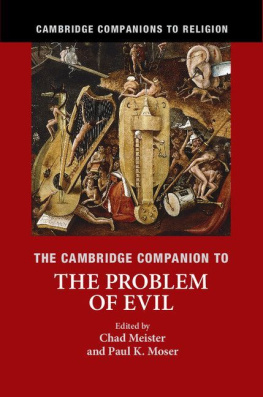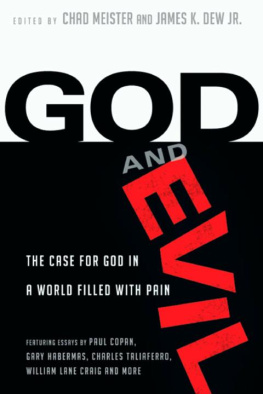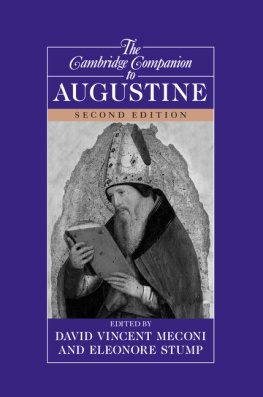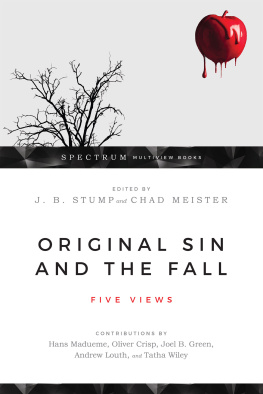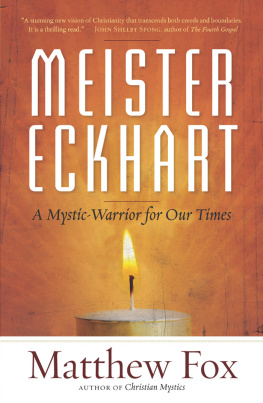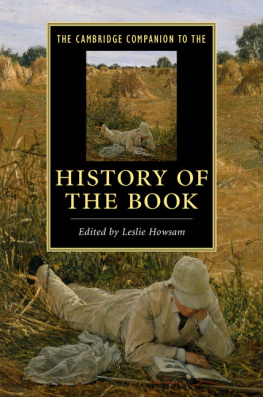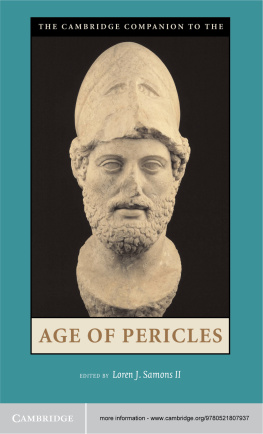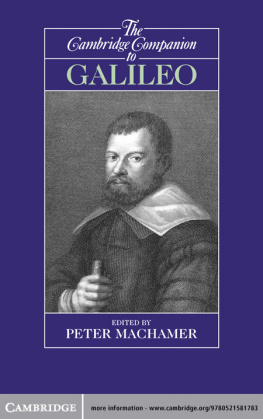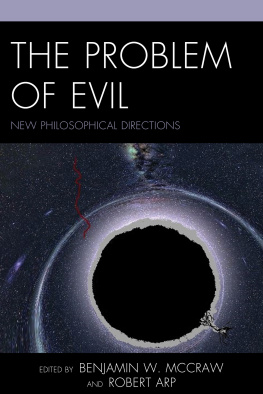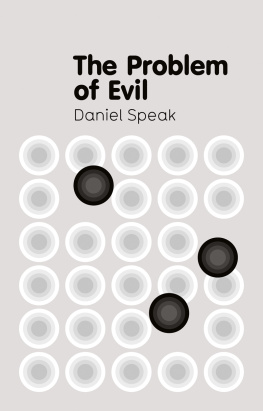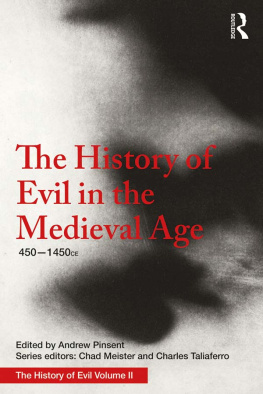Chad Meister - The Cambridge Companion to the Problem of Evil
Here you can read online Chad Meister - The Cambridge Companion to the Problem of Evil full text of the book (entire story) in english for free. Download pdf and epub, get meaning, cover and reviews about this ebook. year: 2017, publisher: Cambridge University Pres, genre: Religion. Description of the work, (preface) as well as reviews are available. Best literature library LitArk.com created for fans of good reading and offers a wide selection of genres:
Romance novel
Science fiction
Adventure
Detective
Science
History
Home and family
Prose
Art
Politics
Computer
Non-fiction
Religion
Business
Children
Humor
Choose a favorite category and find really read worthwhile books. Enjoy immersion in the world of imagination, feel the emotions of the characters or learn something new for yourself, make an fascinating discovery.
- Book:The Cambridge Companion to the Problem of Evil
- Author:
- Publisher:Cambridge University Pres
- Genre:
- Year:2017
- Rating:5 / 5
- Favourites:Add to favourites
- Your mark:
- 100
- 1
- 2
- 3
- 4
- 5
The Cambridge Companion to the Problem of Evil: summary, description and annotation
We offer to read an annotation, description, summary or preface (depends on what the author of the book "The Cambridge Companion to the Problem of Evil" wrote himself). If you haven't found the necessary information about the book — write in the comments, we will try to find it.
The Cambridge Companion to the Problem of Evil — read online for free the complete book (whole text) full work
Below is the text of the book, divided by pages. System saving the place of the last page read, allows you to conveniently read the book "The Cambridge Companion to the Problem of Evil" online for free, without having to search again every time where you left off. Put a bookmark, and you can go to the page where you finished reading at any time.
Font size:
Interval:
Bookmark:
The Cambridge Companion to The Problem of Evil
For many centuries philosophers have been discussing the problem of evil one of the greatest problems of intellectual history. There are many facets to the problem, and for students and scholars unfamiliar with the vast literature on the subject, grasping the main issues can be a daunting task. This Companion provides a stimulating introduction to the problem of evil. More than an introduction to the subject, it is a state-of-the-art contribution to the field which provides critical analyses of and creative insights on this long-standing problem. Fresh themes in the book include evil and the meaning of life, beauty and evil, evil and cosmic evolution, and anti-theodicy. Evil is discussed from the perspectives of the major monotheistic religions, agnosticism, and atheism. Written by leading scholars in clear and accessible prose, this book is an ideal companion for undergraduate and graduate students, teachers, and scholars across the disciplines.
Chad Meister has published extensively on the subject of evil, including Evil: A Guide for the Perplexed (2012), God and the Problem of Evil: Five Views (2017), and The History of Evil in six volumes (2017). He has done research on the topic at the University of Oxford and as the William Patton Fellow at the John Hick Centre for Global Philosophy of Religion. His book, coedited with William Lane Craig and entitled God Is Great, God Is Good (2009), won the Christianity Today Book award. At Bethel College he received the Professor of the Year award for teaching excellence.
Paul K. Moser is Professor of Philosophy at Loyola University Chicago. He is the author of The God Relationship (Cambridge University Press, 2017); The Elusive God (Cambridge University Press, 2010), winner of national book award from the Jesuit Honor Society; The Evidence for God (Cambridge University Press, 2010); The Severity of God (Cambridge University Press, 2013); Knowledge and Evidence (Cambridge University Press, 1991); and Philosophy after Objectivity (1993); coauthor of Theory of Knowledge (1997); editor of Jesus and Philosophy (Cambridge University Press, 2008) and The Oxford Handbook of Epistemology (2005); coeditor of The Wisdom of the Christian Faith (Cambridge University Press, 2012). He is the coeditor with Chad Meister of Cambridge Studies in Religion, Philosophy, and Society.
This is a series of companions to major topics and key figures in theology and religious studies. Each volume contains specially commissioned chapters by international scholars, which provide an accessible and stimulating introduction to the subject for new readers and nonspecialists.
AMERICAN ISLAM Edited by Juliane Hammer and Omid Safi
AMERICAN JUDAISM Edited by Dana Evan Kaplan
AMERICAN METHODISM Edited by Jason E. Vickers
ANCIENT MEDITERRANEAN RELIGIONS Edited by Barbette Stanley Spaeth
KARL BARTH Edited by John Webster
THE BIBLE , 2nd edition Edited by Bruce Chilton
BIBLICAL INTERPRETATION Edited by John Barton
DIETRICH BONHOEFFER Edited by John de Gruchy
JOHN CALVIN Edited by Donald K. McKim
CHRISTIAN DOCTRINE Edited by Colin Gunton
CHRISTIAN ETHICS Edited by Robin Gill
CHRISTIAN MYSTICISM Edited by Amy Hollywood and Patricia Z. Beckman
CHRISTIAN PHILOSOPHICAL THEOLOGY Edited by Charles Taliaferro and Chad Meister
CLASSICAL ISLAMIC THEOLOGY Edited by Tim Winter
JONATHAN EDWARDS Edited by Stephen J. Stein
FEMINIST THEOLOGY Edited by Susan Frank Parsons
THE JESUITS Edited by Thomas Worcester
JESUS Edited by Markus Bockmuehl
C. S. LEWIS Edited by Robert MacSwain and Michael Ward
LIBERATION THEOLOGY Edited by Chris Rowland
MARTIN LUTHER Edited by Donald K. McKim
MEDIEVAL JEWISH PHILOSOPHY Edited by Daniel H. Frank and Oliver Leaman
MODERN JEWISH PHILOSOPHY Edited by Michael L. Morgan and Peter Eli Gordon
MOHAMMED Edited by Jonathan E. Brockup
PENTECOSTALISM Edited by Cecil M. Robeck, Jr and Amos Yong
POLITICAL THEOLOGY Edited by Craig Hovey and Elizabeth Phillips
POSTMODERN THEOLOGY Edited by Kevin J. Vanhoozer
PURITANISM Edited by John Coffey and Paul C. H. Lim
THE QURAN Edited by Jane Dammen McAuliffe
KARL RAHNER Edited by Declan Marmion and Mary E. Hines
REFORMATION THEOLOGY Edited by David Bagchi and David Steinmetz
RELIGIOUS STUDIES Edited by Robert A. Orsi
FREIDRICK SCHLEIERMACHER Edited by Jacqueline Maria
SCIENCE AND RELIGION Edited by Peter Harrison
ST. PAUL Edited by James D. G. Dunn
SUFISM Edited by Lloyd Ridgeon
THE TALMUD AND RABBINIC LITERATURE Edited by Charlotte E. Fonrobert and Martin S. Jaffee
HANS URS VON BALTHASAR Edited by Edward T. Oakes and David Moss
JOHN WESLEY Edited by Randy L. Maddox and Jason E. Vickers
REFORMED RELIGION Edited by Paul T. Nimmo and David A.S. Fergusson
SUMMA THEOLOGIAE Edited by Philip McCosker and Denys Turner
HEBREW BIBLE/OLD TESTAMENT Edited Stephen B. Chapman and Marvin A. Sweeney
The Cambridge Companion to The Problem of Evil
Edited by
Chad Meister
Bethel College, Indiana
Paul K. Moser
Loyola University, Chicago


One Liberty Plaza, 20th Floor, New York, NY 10006, USA
Cambridge University Press is part of the University of Cambridge.
It furthers the Universitys mission by disseminating knowledge in the pursuit of education, learning, and research at the highest international levels of excellence.
www.cambridge.org
Information on this title: www.cambridge.org/9781107636026
DOI : 10.1017/9781107295278
Cambridge University Press 2017
This publication is in copyright. Subject to statutory exception and to the provisions of relevant collective licensing agreements, no reproduction of any part may take place without the written permission of Cambridge University Press.
First published 2017
Printed in the United States of America by Sheridan Books, Inc.
A catalogue record for this publication is available from the British Library.
Library of Congress Cataloging-in-Publication Data
Names: Meister, Chad, 1965 editor. | Moser, Paul K. 1957 editor.
Title: The Cambridge companion to the problem of evil / [edited by] Chad Meister,
Bethel College, Indiana Paul K. Moser, Loyola University, Chicago.
Description: New York: Cambridge University Press, 2017. | Series: Cambridge
companions to religion | Includes bibliographical references and index.
Identifiers: LCCN 2017004141 | ISBN 9781107055384 (hardback) | ISBN 9781107636026 (paperback)
Subjects: LCSH: Good and evil. | Good and evil Religious aspects.
Classification: LCC BJ1401 .C27 2017 | DDC 170dc23
LC record available at https://lccn.loc.gov/2017004141
ISBN 978-1-107-05538-4 Hardback
ISBN 978-1-107-63602-6 Paperback
Cambridge University Press has no responsibility for the persistence or accuracy of URL s for external or third-party internet websites referred to in this publication and does not guarantee that any content on such websites is, or will remain, accurate or appropriate.
Chad Meister and Paul K. Moser
John Cottingham
Charles Taliaferro
Graham Oppy
Paul Draper
Font size:
Interval:
Bookmark:
Similar books «The Cambridge Companion to the Problem of Evil»
Look at similar books to The Cambridge Companion to the Problem of Evil. We have selected literature similar in name and meaning in the hope of providing readers with more options to find new, interesting, not yet read works.
Discussion, reviews of the book The Cambridge Companion to the Problem of Evil and just readers' own opinions. Leave your comments, write what you think about the work, its meaning or the main characters. Specify what exactly you liked and what you didn't like, and why you think so.

